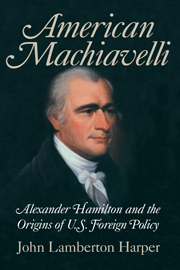Book contents
- Frontmatter
- Contents
- List of Illustrations
- Acknowledgments
- Miscellaneous Frontmatter
- Introduction
- PART I THE COMING OF NECESSITY
- PART II BATTLE LINES ARE DRAWN
- PART III SEIZING THE HELM
- PART IV INFORMAL ADVISER TO THE PRINCE
- PART V A PRINCE IN HIS OWN RIGHT?
- 16 Hamilton and Adams: The Background
- 17 Hamilton’s “Grand Plan”
- 18 Hamilton and His Army, Part One, 1797–1798
- 19 Hamilton and His Army, Part Two, 1798–1799
- 20 Killing Two Birds with One Stone, 1799
- PART VI THE LESSER OF EVILS
- Conclusion: Hamilton Then and Now
- Notes
- Bibliography
- Index
20 - Killing Two Birds with One Stone, 1799
Published online by Cambridge University Press: 05 April 2013
- Frontmatter
- Contents
- List of Illustrations
- Acknowledgments
- Miscellaneous Frontmatter
- Introduction
- PART I THE COMING OF NECESSITY
- PART II BATTLE LINES ARE DRAWN
- PART III SEIZING THE HELM
- PART IV INFORMAL ADVISER TO THE PRINCE
- PART V A PRINCE IN HIS OWN RIGHT?
- 16 Hamilton and Adams: The Background
- 17 Hamilton’s “Grand Plan”
- 18 Hamilton and His Army, Part One, 1797–1798
- 19 Hamilton and His Army, Part Two, 1798–1799
- 20 Killing Two Birds with One Stone, 1799
- PART VI THE LESSER OF EVILS
- Conclusion: Hamilton Then and Now
- Notes
- Bibliography
- Index
Summary
Karl-Friedrich Walling writes that the approach of Hamilton and the Federalists to internal dissent from 1798 to 1799 reflected an “essentially Machiavellian psychology of empire: combine fear with love to produce loyalty; but if one is compelled to rely on fear, then take great care to avoid producing hatred for the authority one seeks to establish.” Walling’s is a shrewd observation. Unfortunately, however, from the point of view of their enemies, the Federalists seemed to be following a too-literal reading of The Prince: in situations where one cannot be both, “it is much more secure to be feared than loved.” And they would have done well to pay greater attention to the dictum from the same chapter: “men more quickly forget the death of a father than the loss of their property.”
If mistakes like these were avoidable, Hamilton can be more easily forgiven for failing to understand John Adams’s capacity for self-delusion. For months, the president had been determined to cut Hamilton and his army down to size. In early 1799, he asserted (as Gerry noted after speaking with him in March) that the Federalist plan was “to get an army on foot to give Hamilton the command of it & then to proclaim a Regal Government, place Hamilton at the Head of it & prepare the way for a Province of Great Britain.” At the same time, Adams was remarkably lucid when it came to the army’s growing political consequences. The widely reviled project was giving help on a silver platter to the Republican party, which would oppose him in 1800. Having taken a preliminary step in December, Adams now prepared what has inexplicably been called “perhaps the bravest” move of his career. In reality, it was a move calculated to recoup his personal authority and popularity while crippling his two political opponents, Hamilton and Jefferson, in a single blow.
- Type
- Chapter
- Information
- American MachiavelliAlexander Hamilton and the Origins of U.S. Foreign Policy, pp. 237 - 248Publisher: Cambridge University PressPrint publication year: 2004



